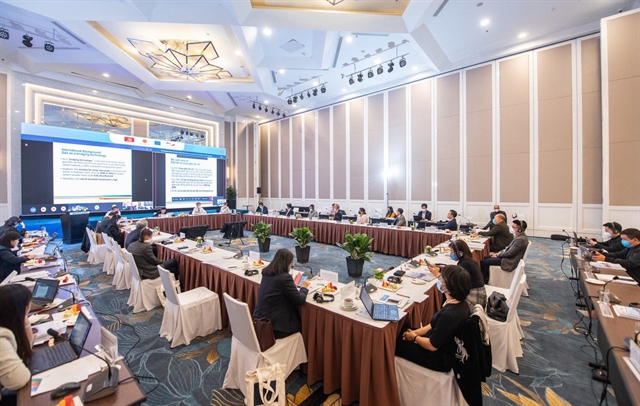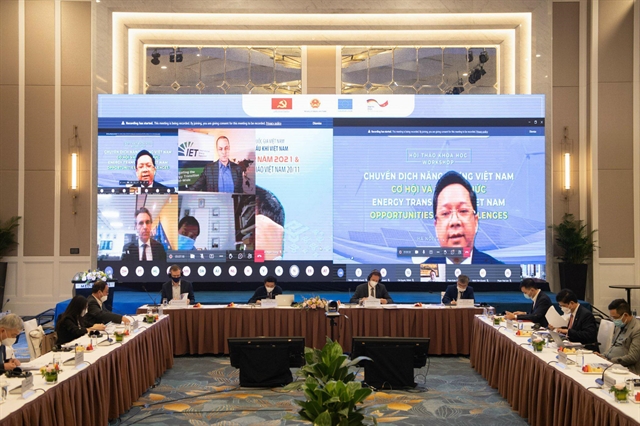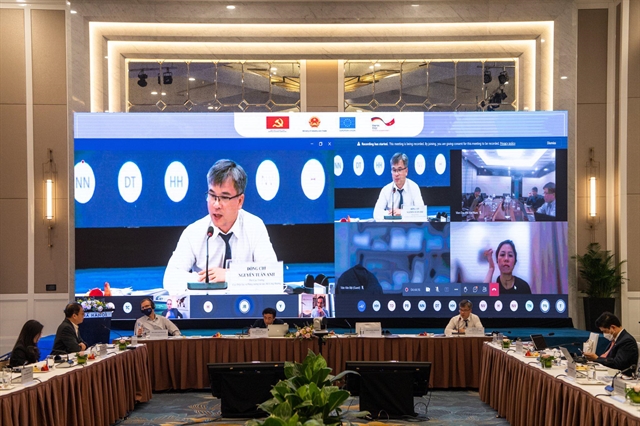 Society
Society

Việt Nam has step up the transition to efficient and renewable energies to tap opportunities for sustainable development but challenges remain, heard a conference held in Hà Nội on Wednesday.

|
| The “Energy transition in Việt Nam - Opportunities and Challenges” workshop took place in Hà Nội on Wednesday. Photos courtesy of GIZ Vietnam |
HÀ NỘI — Việt Nam has step up the transition to efficient and renewable energies to tap opportunities for sustainable development, but challenges remain, heard a conference held in Hà Nội on Wednesday.
The workshop, titled “Energy transition in Việt Nam - Opportunities and Challenges”, was an opportunity for leading experts from governments, businesses, think tanks and national and international organisations to share experience and give recommendations about key policies on sustainable energy transition for Việt Nam.
It was jointly organised in both online and in-person forms by the Party Central Committee’s Economic Commission and the German Development Cooperation Agency (GIZ).
The conference was part of the project on “A number of studies on energy transition in connection with effective and sustainable energy infrastructure development for socio-economic development of Việt Nam by 2030, with a vision to 2045”.
The project has been implemented by the commission and GIZ in 2021 within the framework of the EU-Vietnam Energy Facility (EVEF) Project which is funded by the European Union and the German Federal Ministry of Economic Cooperation and Development (BMZ).

|
| Deputy head of the Party Central Committee’s Economic Commission Nguyễn Đức Hiển takes the floor. |
Speaking at the event, deputy head of the Party Central Committee’s Economic Commission Nguyễn Đức Hiển said energy transition was an inevitable path.
Promoting the transformation of energy from traditional sources of energy and fossil fuels to green, clean and renewable energies was a global trend to meet the development of sustainable economy and climate change adaptation demands, he said.
As one of six countries that would suffer the most from climate change, Việt Nam over the past years has actively implemented its commitment for the 2030 Agenda for Sustainable Development and actively taken part in the Paris Agreement as part of the 21st conference of Parties to the United Nations Framework Convention on Climate Change (COP 21).
At the recent COP 26 held in the UK, Việt Nam targeted to achieve net-zero greenhouse gases emissions by 2050.
The Politburo issued the Resolution 55 in 2020 on “Orientation of Việt Nam’s National Energy Development Strategy by 2030 with a vision towards 2045” which put forward a system of viewpoints, goals and measures about energy transition in Việt Nam in the future, according to Hiển.
In order to ensure national energy security, the Resolution set the target of prioritising the exploitation and effective use of renewable energies and new and clean energies with the goals of increasing the share of renewable energies to 15-20 per cent of the country’s total primary energy supply by 2030 and 25-30 per cent by 2045.
However, Hiển said, energy transition was facing difficulties due to the impacts of the COVID-19 pandemic while ensuring energy security, including ensuring energy supply sources with reasonable prices, also posed challenges for the energy sector.
Despite difficulties, energy development has recorded positive changes with an increase of renewable energy projects being built and put into operation, he said.

|
| Deputy Director Generalof the Ministry of Industry and Trade's Electricity and Renewable Energy Authority, Nguyễn Tuấn Anh addresses the conference. |
At the conference, experts from the project reported on the implementation results of the project as well as energy transition trends in the world and shared Germany’s experience in this field.
Representatives from State-owned energy corporations, including the Electricity of Việt Nam (EVN), the Vietnam Oil and Gas Group (PVN) and the Vietnam National Coal-Mineral Industries Holding Corporation Limited (TKV) reported about their energy transition orientations in the future.
A representative from the EVN said the corporation would focus on researching and applying new technologies, developing power transmission grids in coordination with Laos to expand the Southeast Asian connection formed between Laos, Thailand, Malaysia and Singapore and study a plan to develop high voltage direct current (DC) power transmission system to carry electricity from the south to the north.
EVN plans to follow the Industry 4.0 to invest in building and managing the operation of the power system to supply electricity for customers with reasonable prices.
A representative from the PVN said its strengths when taking part in energy transition is the reciprocal linkage in the oil and gas value chain; wide cooperation with foreign partners in the field of energy that could help the PVN to acquire knowledge and technology about energy transition; and experience and infrastructure from the oil and gas value chain.
Energy transition also has positive impacts on the coal sector, including promoting scientific research and production technology reform to increase productivity, reduce production costs and improve competitiveness and operation efficiency of businesses; and creating conditions to research and develop renewable energy products in line with the energy transition trend, according to a representative from the TKV.
At the conference, participants also discussed about mechanisms and policies needed to promote the energy transition process in connection with a long-term vision about reducing carbon emissions towards the target of carbon emission neutrality by 2050 as committed by Việt Nam at the COP26.
They gave some recommendations about policy framework to enhance energy transition of Việt Nam effectively and sustainably in connection with the implementation of the Resolution 55.
Under the national power development plan for the period 2021-2030, with a vision to 2045, Việt Nam would diversify its energy sources, focusing on developing clean and renewable energy via wind power, solar power, biomass power, waste to energy power, aiming to increase the share of clean energy in its total primary energy supply. — VNS




